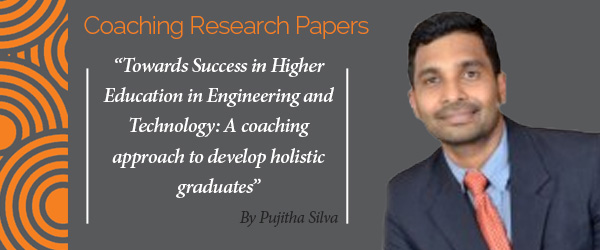Research Paper By Pujitha Silva
(Life Coaching, AUSTRALIA)
Towards Success in Higher Education in Engineering and Technology:
A coaching approach to develop holistic graduates
Abstract
There is a growing gap between engineering practice and engineering education that may be contributing to less engineers practicing in industry. Coaching approach to learning and teaching has been proven to be an effective way to develop people in the workplace. A pilot coaching program is offered to Engineering and Technology students in Queensland University of Technology to enable holistic growth in order to better integrate them to the work force and society at large. The results and findings of this program will be published once the program has been completed.
Keywords
Mentoring; Engineering Leadership; Life Coaching; Higher Degree Research; Success Factors
I. INTRODUCTION
Higher education plays a crucial role in the economic and social progress of a nation, with higher education training affording graduates to meet the needs of business, governments, industry and branches of society Overall, an outstanding higher education system is deemed essential to maintain a high standard of living and a balanced society.
The resource boom in mining in particular has left Australia facing a severe shortage of engineers, with a growing demand for skilled engineers in the industry. According to the senate inquiry held in 2012 into the shortage of engineers
Australia produces less than half of its current annual engineering workforce needs. Even with Australian universities and TAFEs producing around 9,000 graduates annually, Australia is still unable to provide a reliable domestic solution to these key shortages [1].
This calls for Australian higher education institutions to increase the intake of students and promote engineering education at all levels to meet the local demand.
Despite the growing demand for engineers, there is a growing gap between engineering practice and engineering education [2, 3]. The notion that engineering practice is technical problem solving and design has been challenged given that engineers spend a large proportion of their time dealing with people, which existing models describing engineering practice fail to address [3]. It is also becoming more evident that there are a set of non-technical skills that engineers need to be in possession of in order to be successful practitioners in industry [2]. There is a significant percentage of engineering graduates with Australian degrees who do not secure employment as engineers, arguably as a result of lacking in these essential non-technical skills [4]. These are described as soft skills [5]. These ‘soft skills’ and are seen to play an important role from securing employment, to fitting into the work culture and ultimately progressing through to management [4].
